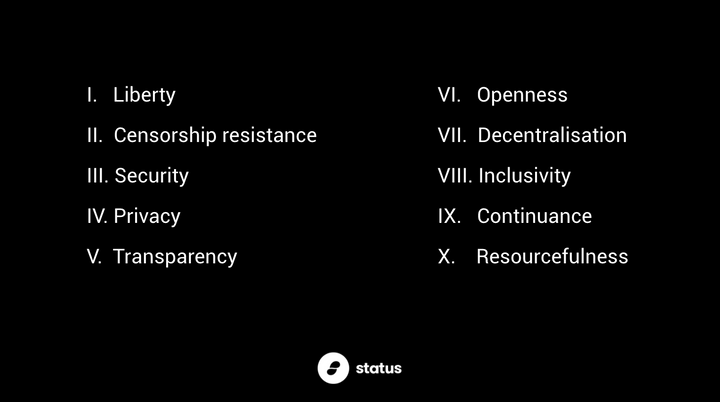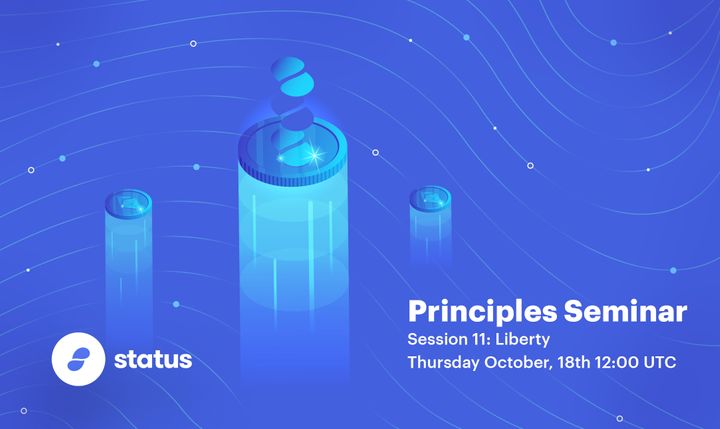In the fifth session of this 12 part series, join status' core contributors as we discuss and debate to which degree we uphold our principles, how we can improve our performance, and what we're adding to our Wall of Shame.
Decentralization:
We minimize centralization across both the software and the organization itself. In other words, we maximize the number of physical computers composing the network, and maximize the number of individuals who have control over the system(s) we are building.
Slide Deck:
Seminar Opening presentation
Seminar Index
Decentralization (people) Session Notes (reprinted below)
Youtube:
Wall of shame
Centralized decision making re: hiring, salary increases, headcount, etc.
Make clear narratives that people can see the value and how it pertains to them
OSS but only core contributors contributing
Notes
JB:
People Ops - kind of hybrid, some of the things we do are still centralized - forexample how do we decide how to hire, how to pay people? comp and performaance managament for example - doing that in a decentralized way is much more complex, privacy concerns, tools, etc
as some said - maybe we have to be okay to keep some processes centralized for efficiancy's sake
How strongly do people feel about centralization
Carl:
What's gonna keep us more competitive over time? what's the future cost of current efficiency? Be mindful of implementing processes that don't scale
Graeme:
Working on the voting dapp - currently taking things slow, low hanging fruit is working
Legimacy of decisions - transparency - decentralized decision making (not a small group of individuals)
Partaking in a system in a permissionless way; the scope of tools we have available is so limited/new
Ricardo
Like democracy in governments, people want to decentralize decision making. What we want is a direct democracy kind of thing where we don't elect a representative
JB
Some companies instead of relying on management would elect a group of peers to make decsions around compensation/performance
Graeme
On something like this, it's okay to start with things we can replace easily, low hanging fruit
Tackle the problem a bit at the time instead of trying to decentralize all the things!
JB
trying to decentralize part of the hiring decisions - present a need to the community and let them decide how to prioritize and how to bring them in
Akshi:
How would voting work? only 1 vote per person?
JB
Haven't yet put much thought on it, only idea was our SITG exp
Graeme
Great question and perfect example - if we can vote, who is entitled to?
Oskar
Hiring is a bit of a traditional field - change that
Carl
Could remove hiring completely, break down the tasks instead and compensate people for value of a piece of work, instead of time spent
Oskar
How do people feel about that?
Rachel:
Sometimes it's difficult to break things into tasks, how do you solve that?
Akshi:
Yes, and also - how do we keep people accountable for the global perspective and direction if you break into tasks?
Like the idea to compensate people by task/output
but there is lots to think about on the implications
On hiring-voting - there should be a budget per team, and the team should be able to decide if using it to hire or other things (teams to decide if adding resources or doing the work themselves and spending in other ways)
JB
Very important point ^
Ricardo
I'm sure that many would like to be paid that way, but the practical implementation would be very hard, as the market is really still based on the time comp model
Akshi
Task-based pitches could reduce innovation/creative ideas because of having no big picture in mind - no incentive in thinking further
Gloomy ^ agrees
Ceri
is that so binary and is that really a concern?
Oskar:
A task doesn't need to be a MINI task, it can be lots more high level and bigger. It can still be the same framework, leaving room for research
Jacek:
Implementation might be difficult but that's the direction we're going to
Graeme
If someone is funding tasks, it means there's an expected ROI
Gloomy
Some projects are better than others for this
Graeme
What are potential decentralized funding mechanics for the future?
Ned
Is that what orgs like Giveth do? just propose - swarm - go, if the organization funding you thinks it's valuable
Gloomy
It's then very similar to venture
and how do you keep things running - maintainence? who's gonna fund those continuance boring tasks?
Oskar
one way is for a company to provide services to the DAO
JB
What are the issues that people see are killing our competitive advantage/are very centralized/WoS items?
Carl
We're an open source project and the only people working on it are on payroll
Oskar
Linux example
Ricardo
They're paid in fact by redhat/canonical
Graeme
need to generate more interest - incentives
Akshi
is there a philosophical gap to bridge - and how do we make this scale?
Iuri
Has to do with what we discussed yesterday on the protocol
Akshi
Agree with that Iuri - hard to have contributors without a platform and / or an ardent user base
... The incentive in that case is for the users to just make their changes directly for their own personal benefit
Rachel
+1 - many successful OSS projects are so active because developers are acting in their own interest when they contribute.
Oskar
So why us not?
Ned
Everybody seems to understand that our value is the value we put in ourselves. It's for everyone in Web3, building similar tools, facing similar challenges, wanting to collaborate
Ricardo
Needing a roadmap
From Zoom chat
From Barry to All panelists and attendees: (08:50 PM)
You also have to consider why some people choose to be employees over entrepreneurs, entrepreneurs are willing to give up a consistent income for a higher variable income and that explains why in the market software projects that get contracted out cost more to build by an external firm.
From Akshi Federici to All panelists and attendees: (08:55 PM)
Agree with that Iuri - hard to have contributors without a platform and / or an ardent user base
The incentive in that case is for the users to just make their changes directly for their own personal benefit
From Rachel Hamlin to All panelists and attendees: (08:56 PM)
+1 - many successful OSS projects are so active because developers are acting in their own interest when they contribute.
From Me to All panelists and attendees: (08:57 PM)
100% - so why shouldn’t that apply to us?
From Akshi Federici to All panelists and attendees: (08:58 PM)
I think it can
From Akshi Federici to All panelists and attendees: (09:00 PM)
Maybe it is staged (as in, in stages) or a combination too in that initially have actual incentives to contribute more broadly from the community but then over time as adoption gets to scale etc., maybe users themselves organically don’t even look for or care about incentives and open source solve the patches themselves
From Gloomy Loving Archæocete to All panelists and attendees: (09:00 PM)
yeah, probably we should figure out the ways to incentivise these developers and just go into that direction
From Gloomy Loving Archæocete to All panelists and attendees: (09:00 PM)
making our repo & protocol accessible it’s like removing our leg from a brake pedal
but we need to push acceleration as well :)
From Ned Karlovich to All panelists and attendees: (09:02 PM)
We build a car that drives itself no? :)
From Rachel Hamlin to All panelists and attendees: (09:03 PM)
I think it can too but given the relatively low product usage we see right now + the skill sets required to contribute, makes sense that we’ll need to incentivize more upfront
From Me to All panelists and attendees: (09:03 PM)
What can we do to shift the culture in terms of core contributors incentivizing this? That itself takes work
From Gloomy Loving Archæocete to All panelists and attendees: (09:04 PM)
which ways can we incentivize external contribution?
From Ned Karlovich to All panelists and attendees: (09:04 PM)
We need to have the proper foundation set to allow people to play within this framework from all different backgrounds
From Gloomy Loving Archæocete to All panelists and attendees: (09:05 PM)
practically, Embark has this incentive built-in, and Nimbus has
From lukasz to All panelists and attendees: (09:05 PM)
I think low product usage / adoption is one of reasons we don’t see much of external contribution. Without users, potential contributors may not feel that they are making real impact
From Gloomy Loving Archæocete to All panelists and attendees: (09:06 PM)
may be, but to contribute, our users should be devs as well
From Gloomy Loving Archæocete to All panelists and attendees: (09:06 PM)
so if all your user are devs that use your platform = this is best case scenario
From Corey Petty to All panelists: (09:06 PM)
a subset of them will be
From Ned Karlovich to All panelists and attendees: (09:06 PM)
Its also always a balance of hearing from a user perspective and dev perspective together. design + dev <3
From Corey Petty to All panelists: (09:07 PM)
but we don't need to require only devs use the platform.. that limits our reach
From Josh Wrede to All panelists and attendees: (09:07 PM)
At GitLab we would do things to recognize and incentivize our contributors by having things like “contributor of the month” and recognize them publicly + as time went on would give cool prizes, and even fly the top one’s to our team summits and things like that. It created a cool culture where they felt apart of the team and recognized/took pride in it
From Akshi Federici to All panelists and attendees: (09:07 PM)
Some random thoughts to Oskar’s question: a) explicitly make that a KPI / OKR of core contributors who are “stewards” to get community participation b) incentivize external contributors both monetarily (SNT or Eth etc.) or non-monetarily (reputation walls, badges etc.) and c) making sure all our products have the tactical tools and mechanisms to allow community contribution - so, similar to what Embark and Nimbus have achieved in the “built-in” nature of ability for external community to contribute to / within the product directly
From Gloomy Loving Archæocete to All panelists and attendees: (09:10 PM)
even more high-level q
i’m a developer who happens to know the right technologies
why would I contribute to Status (mobile+desktop)?
what could be my reasons?
From Me to All panelists and attendees: (09:11 PM)
Because you use it and want to scratch your own itch, because you like building things, because you believe in what Status is doing, because you want to learn, because you want money
From Me to All panelists and attendees: (09:11 PM)
all of the above or any combination thereof
From Gloomy Loving Archæocete to All panelists and attendees: (09:12 PM)
- because there is a chance to promote myself
- anything else that comes to mind?
From Josh Wrede to All panelists and attendees: (09:12 PM)
Agree oskar. i think the more we could position like a “badge of honor” and make it where others want to join the already recognized contributors the better From
lukasz to All panelists and attendees: (09:12 PM)
I’d also say that you wan’t to use it or you want to help someone who’s already using it From Ned Karlovich to All panelists and attendees: (09:13 PM) And your stronger in a group than as an individual









